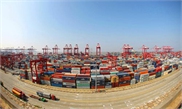China's new foreign investment review rules take effect, bringing country more in line with global practices
Move comes amid US curbs, will bring China more in line with world

An aerial view of Lingang New Area in Shanghai's Pilot Free Trade Zone. As of November 30, 2020, there were 1,573 foreign-funded enterprises in Lingang. Among them, from August 20, 2019 year to the end of November 2020, a total of 515 foreign-funded enterprises were established with registered capital of over $9 billion. Photo: cnsphoto
China's new rules on foreign investment security reviews, unveiled last month, took effect on Monday. The move, coming against the backdrop of the Trump administration's groundless curbs targeting Chinese firms, is seen as a crucial regulation in the new round of high-level opening-up.
Experts noted that the new rules are intended to fill regulatory gaps, allowing the nation to become more aligned with international practices while strengthening China's legal framework for greater opening-up.
The scope of foreign investment that will be subject to security review includes the military industry and other national defense and security fields, major agricultural products and other fields that have importance in national security.
The rules, which contain 23 articles, have the Foreign Investment Law and the National Security Law as their legal basis.
The review range is expanding, which does not mean that the country is tightening its regulation of foreign investment. Instead, it serves as an important regulatory measure in the context of wider opening-up, which can be seen via the continuous reduction of the negative list, a mode applied in determining foreign investment access in China, according to a report released by EY.
In a fresh sign of reckless bullying, just a few days ahead of the end of its term, the Trump administration again slammed China's Huawei Technologies by notifying its suppliers, including chipmaker Intel, that it is revoking certain licenses to sell to the Chinese company and intends to reject dozens of other applications to supply the telecommunications firm, according to a Reuters report.
Last week, the US Defense Department added nine Chinese companies, including smartphone vendor Xiaomi and Commercial Aircraft Corp of China, a major state-owned Chinese plane producer, to a blacklist of alleged Chinese military- linked companies.
"The Trump administration is in its final frenzy, which is not only futile but also sets hurdles for the new administration. Reflecting on the past few years, the Trump administration has crossed a line," Dong Shaopeng, a senior research fellow at the Chongyang Institute for Financial Studies of Renmin University of China, told the Global Times on Monday.
"The fresh rules on security reviews of foreign investment should not be interpreted as a tit-for-tat measure against the US. No matter who entered the White House, we needed such regulation to ensure safety in the economy and industry," Dong noted.
The US has the Foreign Investment Risk Review Modernization Act (FIRRMA), with Australia and the EU having similar laws and regulations.
China's new national security review framework draws on global practices, and it could be that some investments need to be reviewed on a case-by-case basis, as they are not on the negative list for foreign investment but might affect national security, according to Gao Lingyun, an expert at the Chinese Academy of Social Sciences in Beijing.
Under the new foreign investment security review rules, a work mechanism for security reviews of foreign investment would be put in place, with the National Development and Reform Commission (NDRC) and Commerce Ministry heading the review task force, whose office will be set up in the NDRC.
An NDRC official with the review work mechanism office stressed the new rules are not intended to implement protectionism or to roll back on opening-up. The official pledged to ensure targeted reviews of foreign investments that have an impact on or might affect national security, and to avoid the abuse of security reviews.
From 2017 to 2020, China reduced the negative list for foreign investment access each year. The national version and the pilot free trade zone versions reduced the negative list restrictions to 33 and 30, respectively. Sectors ranging from manufacturing and energy resources to infrastructure, agriculture, and finance witnessed significant opening-up.
Meanwhile, China has significantly increased the number and type of items on its newly revised industry catalogue to encourage more foreign investment. The new catalogue, released in December 2020, involves 1,235 items, of which 127 are new and 88 are revised.
The Commerce Ministry estimated that China's actual use of foreign capital hit $140 billion in 2020, a record high.



